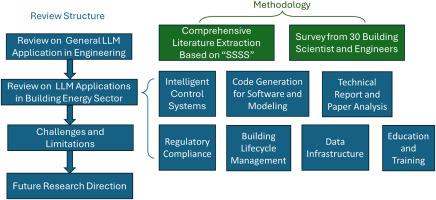Opportunities of applying Large Language Models in building energy sector
IF 16.3
1区 工程技术
Q1 ENERGY & FUELS
引用次数: 0
Abstract
In recent years, the rapid advancement and impressive capabilities of Large Language Models have been evident across various engineering domains. This paper explores the application, implications, and potential of Large Language Models in building energy sectors, especially energy efficiency and decarbonization studies, based on an extensive literature review and a survey from building engineers and scientists. The paper explores how LLMs can enhance intelligent control systems, automate code generation for software and modeling tools, optimize data infrastructure, and refine analysis of technical reports and papers. Additionally, the paper discusses the role of LLMs in improving regulatory compliance, supporting building lifecycle management, and revolutionizing education and training practices within the sector. Despite the promising potential of Large Language Models, challenges including complex and expensive computation, data privacy, security and copyright, complexity in fine-tuned Large Language Models, and self-consistency are discussed. The paper concludes with a call for future research focused on the enhancement of LLMs for domain-specific tasks, multi-modal LLMs, and collaborative research between AI and energy experts.

大语言模型在建筑能源领域应用的机遇
近年来,大型语言模型的快速发展和令人印象深刻的能力已经在各个工程领域得到了明显的体现。本文在广泛的文献综述和建筑工程师和科学家的调查的基础上,探讨了大语言模型在建筑能源领域的应用、影响和潜力,特别是能源效率和脱碳研究。本文探讨了法学硕士如何增强智能控制系统,自动化软件和建模工具的代码生成,优化数据基础设施,以及改进技术报告和论文的分析。此外,本文还讨论了法学硕士在改进法规遵从性、支持建筑生命周期管理以及改革部门内的教育和培训实践方面的作用。尽管大型语言模型有很大的潜力,但也讨论了包括复杂和昂贵的计算、数据隐私、安全和版权、微调大型语言模型的复杂性和自一致性在内的挑战。论文最后呼吁未来的研究重点是增强法学硕士的领域特定任务、多模式法学硕士以及人工智能与能源专家之间的合作研究。
本文章由计算机程序翻译,如有差异,请以英文原文为准。
求助全文
约1分钟内获得全文
求助全文
来源期刊

Renewable and Sustainable Energy Reviews
工程技术-能源与燃料
CiteScore
31.20
自引率
5.70%
发文量
1055
审稿时长
62 days
期刊介绍:
The mission of Renewable and Sustainable Energy Reviews is to disseminate the most compelling and pertinent critical insights in renewable and sustainable energy, fostering collaboration among the research community, private sector, and policy and decision makers. The journal aims to exchange challenges, solutions, innovative concepts, and technologies, contributing to sustainable development, the transition to a low-carbon future, and the attainment of emissions targets outlined by the United Nations Framework Convention on Climate Change.
Renewable and Sustainable Energy Reviews publishes a diverse range of content, including review papers, original research, case studies, and analyses of new technologies, all featuring a substantial review component such as critique, comparison, or analysis. Introducing a distinctive paper type, Expert Insights, the journal presents commissioned mini-reviews authored by field leaders, addressing topics of significant interest. Case studies undergo consideration only if they showcase the work's applicability to other regions or contribute valuable insights to the broader field of renewable and sustainable energy. Notably, a bibliographic or literature review lacking critical analysis is deemed unsuitable for publication.
 求助内容:
求助内容: 应助结果提醒方式:
应助结果提醒方式:


